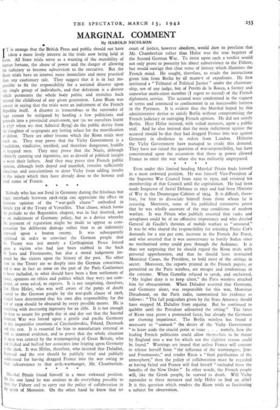Marshal Petain found himself in a most awkward position. On
the one hand he was anxious to do everything possible to obey the Fiihrer and to carry out the policy of collaboration in the spirit of Montoire. On the other hand he knew that no
court of justice, however obedient, would dare to proclaim that Mr. Chamberlain rather than Hitler was the true begetter of the Second German War. To insist upon such a verdict would not only prove to posterity his abject subservience to the Fiihrer, but would outrage that clear sense of history which illumines the French mind. He sought, therefore, to evade the instructions given him from Berlin by all manner of expedients. He first instituted a " Tribunal of Political Justice " under the chairman- ship, not of any judge, but of Peretti de la Rocca, a former and somewhat moth-eaten member (I regret to record) of the French diplomatic service. The accused were condemned in the vaguest of terms and sentenced to confinement in an inaccessible fortress in the Pyrenees. It is evident that the Marshal hoped by this administrative device to satisfy Berlin without compromising the French judiciary or outraging French opinion. He did not satisfy Berlin. Herr Hitler insisted, with veiled menaces, upon a public trial. And he also insisted that the main indictment against the accused should be that they had dragged France into war against Germany in obedience to orders from London. Hitherto the Vichy Government have managed to evade this demand. They have not raised the question of war-responsibility, but have concentrated upon the accusation that those in power allowed France to enter the war when she was militarily unprepared. * * * *


























 Previous page
Previous page